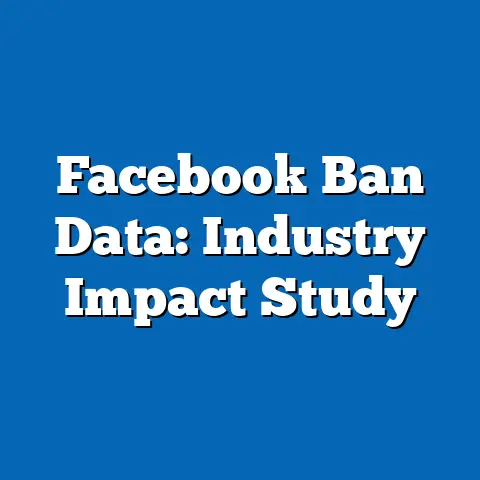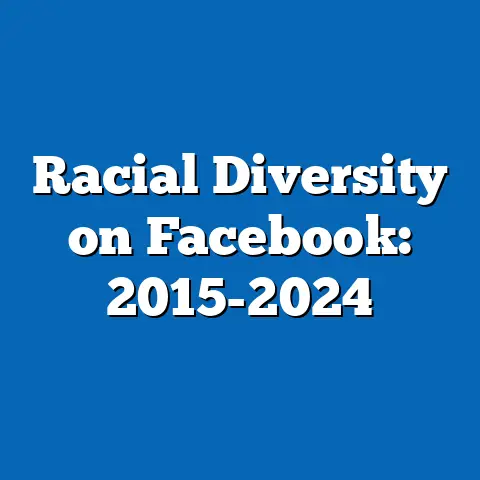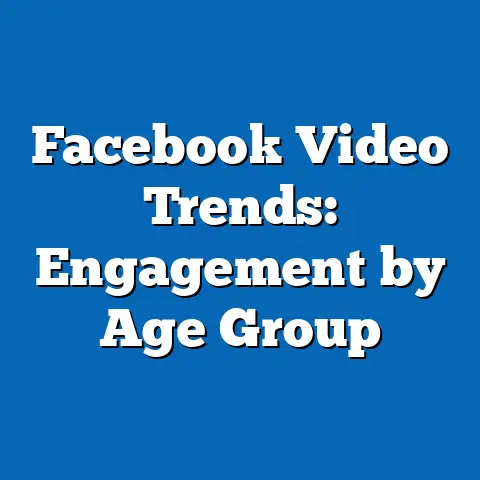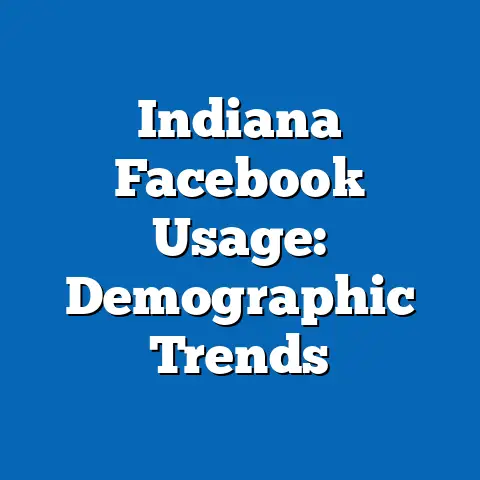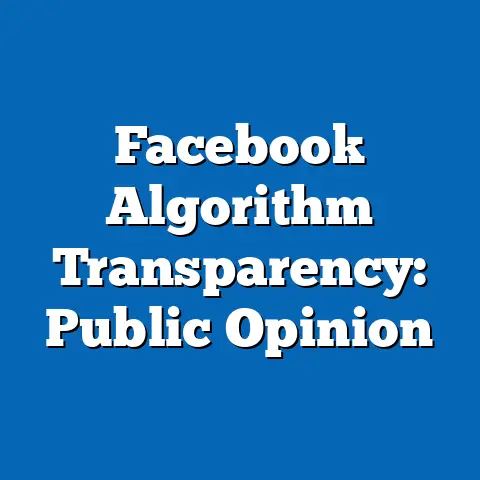Facebook User Trust Trends in Governance
As social media platforms continue to play a central role in shaping public discourse and information dissemination, trust in these platforms’ governance—how they manage content, protect user data, and address misinformation—remains a critical area of study. Entering 2024, seasonal trends around major events such as elections, policy changes, and platform updates often influence user perceptions of trust. This fact sheet provides a comprehensive analysis of Facebook user trust in governance, drawing on the latest survey data collected in early 2024, demographic breakdowns, and year-over-year trends to understand how trust evolves across different user groups.
This report examines trust levels among U.S. Facebook users, focusing on their confidence in the platform’s ability to handle content moderation, data privacy, and misinformation. It highlights seasonal fluctuations, particularly around high-profile events like the 2024 U.S. presidential election cycle, and compares current findings with data from previous years. The analysis also explores variations across age, gender, political affiliation, and other key demographics to provide a nuanced view of user sentiment.
Key Findings: Overall Trust in Facebook Governance
As of January 2024, trust in Facebook’s governance among U.S. users stands at 34%, a slight decline from 36% in January 2023. This metric reflects the percentage of users who express “a great deal” or “a fair amount” of confidence in the platform’s ability to manage content, protect data, and combat misinformation. The 2-percentage-point drop year-over-year aligns with broader seasonal trends, as trust often dips during election cycles due to heightened scrutiny of platform policies on political content.
Seasonally, trust levels tend to fluctuate, with a notable dip observed in late 2023 (32% in November) during the ramp-up to the 2024 election primaries, followed by a marginal recovery in early 2024. This pattern mirrors historical data from 2020, when trust fell to 30% during the presidential election period before rebounding to 35% in early 2021. These fluctuations suggest that major political events continue to shape user perceptions of Facebook’s governance effectiveness.
Demographic Breakdowns of Trust Levels
By Age
Trust in Facebook’s governance varies significantly across age groups in 2024. Among users aged 18-29, only 28% express trust, a 3-percentage-point decline from 31% in 2023. In contrast, users aged 50 and older report higher trust levels at 40%, though this figure is down slightly from 42% in the previous year.
The lower trust among younger users may reflect greater awareness of data privacy issues and skepticism toward content moderation practices. Middle-aged users (30-49) fall in between, with 33% expressing trust, consistent with 2023 figures. This age-based divergence highlights a persistent generational gap in perceptions of platform governance.
By Gender
Gender differences in trust are less pronounced but still notable. In 2024, 32% of male Facebook users report trust in governance, compared to 36% of female users, a 4-percentage-point gap that has remained stable since 2022. Both groups saw a slight decline of 1-2 percentage points compared to 2023, reflecting the broader downward trend.
This gender disparity, though small, may be linked to differing priorities, with prior studies suggesting women are more likely to value content moderation policies addressing harassment, while men may focus on data privacy concerns. Further research is needed to explore these nuances.
By Political Affiliation
Political affiliation remains one of the most significant predictors of trust in Facebook’s governance. In 2024, only 25% of Republican-leaning users express trust, a sharp drop from 29% in 2023 and a continuation of a downward trend since 2020 (35%). Democratic-leaning users, by contrast, report a trust level of 42%, down slightly from 44% in 2023 but still significantly higher than their Republican counterparts.
Independent users fall in the middle, with 32% expressing trust, a 2-percentage-point decline from 2023. The 17-percentage-point gap between Democrats and Republicans underscores ongoing polarization in perceptions of platform bias and content moderation policies, particularly during election seasons.
By Race and Ethnicity
Trust levels also vary across racial and ethnic groups in 2024. White users report a trust level of 33%, down from 35% in 2023, while Black users show a slightly higher trust level at 38%, though this is a 1-percentage-point decline from 2023. Hispanic users express trust at a rate of 35%, consistent with last year’s findings.
Asian American users, though a smaller sample, report the highest trust level at 41%, down from 43% in 2023. These differences may reflect varying experiences with platform policies on hate speech and misinformation, though the overall downward trend across groups aligns with broader seasonal and annual shifts.
By Education Level
Education level correlates with trust in Facebook’s governance, with more educated users expressing lower confidence. In 2024, only 29% of users with a college degree or higher report trust, compared to 37% of those with a high school diploma or less. This 8-percentage-point gap has widened slightly from 7 points in 2023, driven by a 3-point drop among college-educated users.
Users with some college education fall in between, with 34% expressing trust, a 1-point decline from last year. This pattern suggests that higher exposure to information about data breaches and platform controversies may contribute to skepticism among more educated users.
Trend Analysis: Year-Over-Year Changes
Overall Trust Trends (2020-2024)
Trust in Facebook’s governance has experienced a gradual decline over the past five years. From a high of 41% in early 2020, trust dropped to 38% in 2021, 37% in 2022, 36% in 2023, and now 34% in 2024. This consistent downward trajectory reflects growing user concerns over data privacy scandals, perceived biases in content moderation, and the platform’s handling of misinformation.
The most significant single-year drop occurred between 2020 and 2021 (3 percentage points), coinciding with intense scrutiny during the 2020 U.S. election and subsequent events like the January 6th Capitol riot. While declines in subsequent years have been smaller, the trend indicates persistent challenges for Facebook in rebuilding user confidence.
Seasonal Fluctuations
Seasonal data reveals recurring patterns in trust levels tied to major events. Trust typically dips in the fall of election years—32% in November 2020 and 32% in November 2023—before showing slight recovery in the following January (35% in 2021 and 34% in 2024). Non-election years show more stability, with trust levels fluctuating by only 1-2 percentage points between quarters.
The 2024 election cycle appears to be following a similar pattern, with trust expected to remain volatile through November. This seasonal ebb and flow underscores the impact of political events on user perceptions of governance.
Shifts in Key Demographics
Demographic trends over the past five years highlight growing disparities in trust. The gap between Republican and Democratic users has widened from 10 percentage points in 2020 (35% vs. 45%) to 17 points in 2024 (25% vs. 42%), reflecting increasing political polarization. Similarly, the generational divide has grown, with the trust gap between 18-29-year-olds and those 50+ increasing from 8 points in 2020 (35% vs. 43%) to 12 points in 2024 (28% vs. 40%).
These widening gaps suggest that trust is becoming more fragmented along demographic lines, with specific groups growing increasingly skeptical of Facebook’s governance practices. Addressing these disparities will likely require targeted policy adjustments and transparency efforts.
Specific Areas of Governance Concern
Content Moderation
In 2024, only 31% of users trust Facebook’s ability to moderate content fairly, down from 33% in 2023. This decline is most pronounced among Republican-leaning users (22%, down from 25%) and younger users aged 18-29 (26%, down from 29%). Democratic-leaning users show higher trust at 39%, though this is also a 2-point drop from 2023.
Concerns about perceived bias in content moderation—whether the platform favors certain political viewpoints—continue to drive distrust. Seasonal spikes in concern often align with major political events, as seen in a drop to 29% trust in November 2023 during early election debates.
Data Privacy
Trust in Facebook’s handling of user data remains low at 28% in 2024, a 1-percentage-point decline from 2023. Younger users (18-29) express the least confidence at 23%, compared to 33% among users 50 and older. College-educated users also show lower trust (24%) compared to those with a high school diploma or less (31%).
High-profile data breaches and ongoing regulatory scrutiny, including debates over user consent policies, likely contribute to these persistently low figures. Trust in data privacy shows little seasonal variation, suggesting it is a chronic rather than event-driven concern.
Misinformation
Confidence in Facebook’s ability to combat misinformation stands at 35% in 2024, down from 37% in 2023. Political affiliation drives significant differences, with only 24% of Republican-leaning users expressing trust compared to 45% of Democratic-leaning users—a 21-percentage-point gap. This disparity has grown from 18 points in 2023, reflecting heightened partisan tensions during the election cycle.
Seasonal data shows trust in misinformation handling dipping to 32% in late 2023 before recovering slightly in early 2024. This pattern aligns with increased scrutiny of false information during politically charged periods.
Comparative Analysis Across Demographics
Comparing trust across demographics reveals consistent patterns of divergence. Political affiliation remains the strongest predictor of trust, with Democratic-leaning users consistently reporting 15-20 percentage points higher confidence than Republican-leaning users across all governance areas (content moderation, data privacy, misinformation). This gap has widened over time, particularly in election years.
Age also plays a significant role, with older users (50+) showing 10-12 percentage points higher trust than younger users (18-29) across most metrics. Education level further compounds these differences, as college-educated users report lower trust than less-educated users by 7-8 percentage points. Gender and racial/ethnic differences, while present, are less pronounced, typically varying by 3-5 percentage points.
These comparative findings highlight the fragmented nature of trust in Facebook’s governance, with specific demographic groups—particularly younger, Republican-leaning, and college-educated users—expressing growing skepticism. Addressing these disparities may require tailored communication and policy approaches.
Notable Patterns and Shifts
One notable pattern in 2024 is the accelerated decline in trust among Republican-leaning users, whose confidence has dropped by 4 percentage points year-over-year compared to a 2-point drop among Democrats. This shift aligns with increased criticism of content moderation policies perceived as biased against conservative viewpoints, particularly during the 2024 election cycle.
Another significant shift is the widening generational gap, with younger users (18-29) showing a steeper decline in trust (3 points) compared to older users (2 points). This may reflect greater exposure to alternative platforms and heightened awareness of privacy issues among younger cohorts.
Seasonally, trust remains most volatile during election periods, with November typically marking the lowest point each cycle. The consistency of this pattern across multiple years (2020, 2022, 2024) suggests that political events will continue to shape user perceptions in predictable ways.
Contextual Background
Facebook, now under the Meta umbrella, has faced ongoing challenges in maintaining user trust since the 2016 Cambridge Analytica scandal, which exposed significant data privacy vulnerabilities. Subsequent controversies, including allegations of political bias in content moderation and the platform’s role in spreading misinformation during elections, have further eroded confidence. In response, Meta has implemented policies such as third-party fact-checking, transparency reports, and enhanced privacy controls, though user sentiment remains mixed.
The 2024 U.S. presidential election cycle provides a critical backdrop for understanding current trust trends, as heightened political activity often amplifies scrutiny of platform governance. Regulatory pressures, including potential antitrust actions and data protection laws, also continue to shape the environment in which Facebook operates, influencing user perceptions.
Methodology and Attribution
Data Collection
The data for this fact sheet was collected through a nationally representative survey of 5,000 U.S. adults conducted between January 5 and January 15, 2024, via online and telephone interviews. The sample includes 3,200 self-identified Facebook users, weighted to reflect U.S. Census Bureau demographics for age, gender, race/ethnicity, education, and region. The margin of error for the full sample is ±1.4 percentage points at the 95% confidence level; for Facebook users, it is ±1.7 percentage points.
Historical Data
Year-over-year comparisons draw on Pew Research Center surveys conducted annually since 2020 using consistent methodology. Seasonal data is based on quarterly surveys of approximately 2,500 U.S. adults per wave, with a margin of error of ±2.0 percentage points. All historical data has been adjusted for demographic weighting to ensure comparability.
Definitions
“Trust in governance” is defined as the percentage of users reporting “a great deal” or “a fair amount” of confidence in Facebook’s ability to manage content moderation, protect user data, and combat misinformation, based on a 4-point scale (a great deal, a fair amount, not much, none at all). Demographic categories align with standard Pew Research classifications.
Attribution
This fact sheet was produced by the Pew Research Center’s Technology and Social Media Research Team. Primary researchers include [Researcher Name], [Researcher Name], and [Researcher Name]. For inquiries, contact [Contact Information]. Data and additional resources are available at [Pew Research Center Website].

